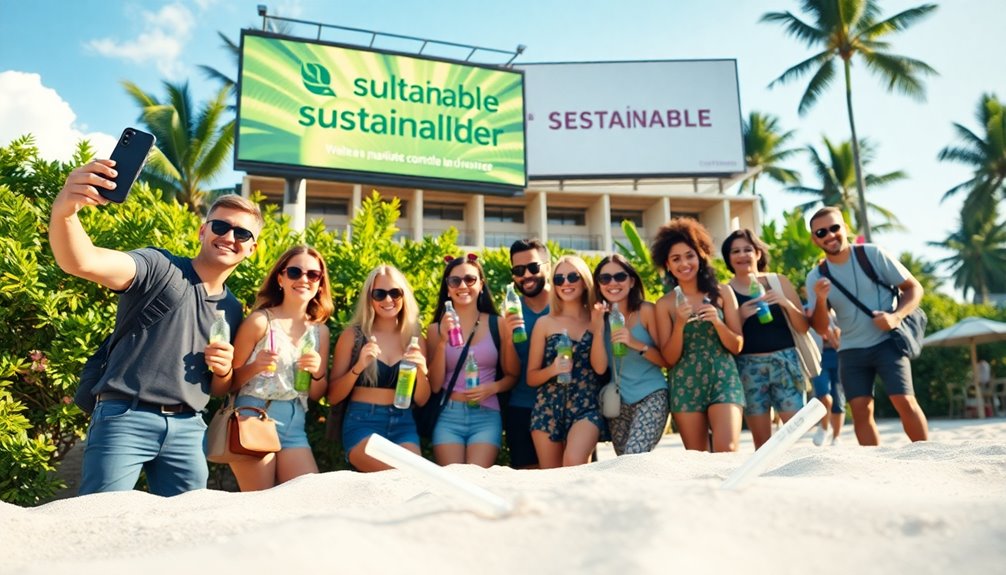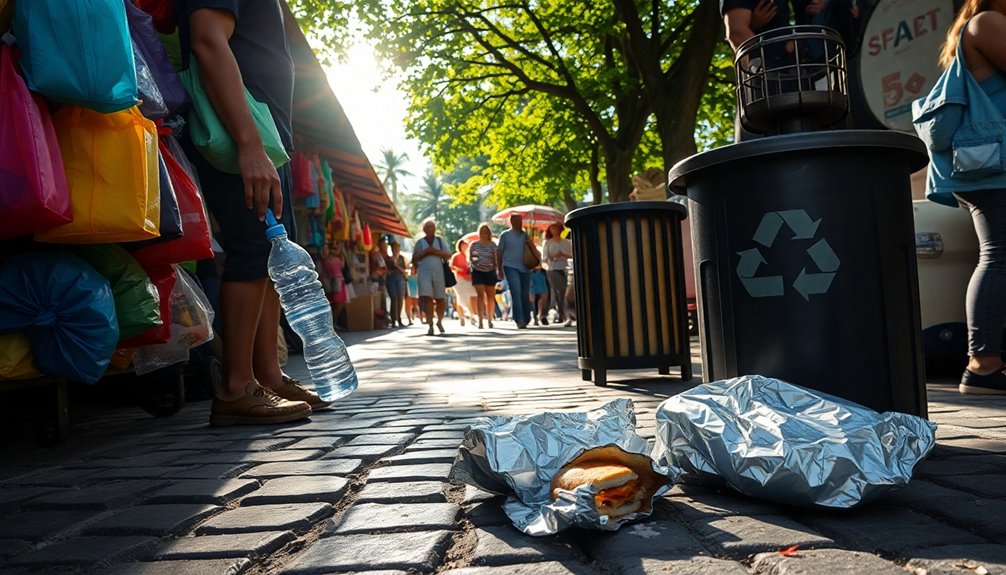You're likely making critical mistakes that hinder your sustainable travel goals. You might be ignoring transportation emissions, opting for cars or flights over greener options like intercity buses. Choosing chain accommodations can mean supporting wasteful practices, while engaging in wildlife tourism may exploit animals. Overpacking increases emissions and waste, and relying on unsustainable booking platforms leads you astray. Don't forget to consider local communities and fair wages for guides. Lastly, using single-use plastics undermines your efforts. If you want to truly travel sustainably, there's a lot more to explore about these common pitfalls.
Key Takeaways
- Relying solely on carbon offsetting without actively reducing your own emissions undermines your sustainable travel efforts.
- Choosing chain hotels over local accommodations limits benefits to local communities and increases waste generation.
- Engaging in wildlife tourism that exploits animals compromises ethical standards and contributes to habitat disruption.
- Overpacking leads to increased fuel consumption and waste; traveling light significantly reduces your carbon footprint.
- Failing to research wage practices for local guides can perpetuate economic inequalities in the communities you visit.
Ignoring Transportation Emissions

While many travelers focus on the fun and excitement of their trips, it's crucial not to overlook the significant impact transportation emissions have on the environment. Did you know that transportation is the largest source of carbon dioxide emissions in the U.S.? Cars and trucks account for 83% of these emissions, and flying generates even more CO2 per passenger mile. You might be surprised to learn that intercity buses are the most sustainable option, emitting just 0.15 lbs per passenger mile compared to almost half a pound for cars. Intercity buses are recognized as being 550% more fuel-efficient than cars on a per-passenger basis. Understanding the importance of portfolio diversification can also help mitigate your overall environmental impact. With tourism-related emissions projected to rise, it's essential to choose your transportation wisely.
Choosing Chain Accommodations

Choosing chain accommodations can often seem like the easiest option for travelers, but it's important to consider their impact on local communities and the environment.
Chain hotels often prioritize corporate interests, leading to limited benefits for the community. Instead, look for local alternatives that support local economies directly. Sustainable supply chains enhance the overall travel experience by fostering connections with local stakeholders. Additionally, engaging with local artists can enrich your understanding of the culture and contribute to the community.
Chain accommodations also consume significant resources and can generate a lot of waste, including single-use plastics.
While some chains have sustainability certifications and energy-efficient measures, not all certified hotels are truly sustainable.
Educate yourself on different certification schemes and the environmental impact of your choices.
Supporting Harmful Wildlife Tourism

Have you ever considered the hidden costs of wildlife tourism? By participating in activities like elephant rides or swimming with dolphins, you're supporting a system that exploits wild animals for entertainment.
Elephants are torn from their families, while dolphins are confined to small tanks, both suffering from physical and psychological trauma. Additionally, responsible travel practices emphasize the importance of making informed choices to protect wildlife and their habitats.
Photo opportunities with tigers and sloths often involve cruel practices, including chaining and drugging. These unethical practices promote the illegal wildlife trade, leading to habitat disruption and long-term health issues for the animals.
If you want to travel sustainably, think twice before engaging in wildlife tourism that prioritizes profit over animal welfare. Choose ethical alternatives that respect wildlife and their natural habitats.
Overpacking for Trips

Overpacking leads to heavier luggage, which increases fuel consumption and carbon emissions during transportation. This not only boosts your carbon footprint but also contributes to resource usage and waste generation, as you often discard unnecessary items. Additionally, traveling light significantly reduces overall carbon footprint, making your travels more sustainable. Plus, overpacked bags can create mobility challenges, incur extra fees, and slow down your travel time. To minimize these issues, create a packing list, eliminate duplicates, and focus on versatile clothing. Adopting a minimalist approach helps you travel sustainably while keeping your journey enjoyable and efficient.
Using Unsustainable Booking Platforms

While you might think booking platforms simplify travel planning, many are far from sustainable. Misleading labels and unclear scoring systems, like those from Booking.com, can leave you confused about the actual sustainability of your options. Booking.com has decided to discontinue its Travel Sustainable program due to pressure from the Netherlands Authority for Consumers and Markets.
You might find it tough to identify eco-friendly choices, as major sites often lack CO2 impact filters and use inconsistent sustainability labels. This makes it hard to compare your options effectively. Additionally, limited availability of clearly defined sustainable travel packages can hinder your efforts to make responsible decisions. The automation of security protocols in technology can also serve as a reminder of the importance of informed decision-making in all aspects of our lives, including travel.
With 83% of travelers prioritizing sustainability, it's crucial to seek platforms that provide transparent, third-party certifications and detailed information to empower your eco-friendly travel choices.
Choose wisely to truly travel sustainably.
Falling for Greenwashing Tactics

How can you tell if a company's sustainability claims are genuine or just clever marketing? Start by scrutinizing their language. If you see vague terms like "eco-friendly" without clear evidence, be cautious.
Watch out for exaggerated claims, such as being carbon neutral without actual emission reductions. Transparency is key; companies should openly share their sustainability practices and metrics. For instance, some companies may claim carbon neutrality via tree-planting without addressing actual emissions.
Check for inconsistent messaging—what they say in marketing materials should match their real actions. Be wary of overreliance on customer participation; if they shift the responsibility onto you without making substantial changes themselves, that's a red flag.
Ultimately, focus on companies that back their claims with proven, meaningful actions rather than just small initiatives or token gestures.
Neglecting Local Communities

When tourism development skips over local communities, it often leads to decisions that don't reflect their needs or values. Ignoring local voices can result in unsustainable practices that harm both the environment and local culture.
You might unintentionally disrespect traditions, contributing to cultural loss and economic inequality. By failing to support local businesses, you're missing the chance to keep economic benefits circulating within the community and creating job opportunities. This oversight can also limit cultural preservation and community empowerment. To travel sustainably, engage with locals and prioritize their input. Supporting their businesses not only enhances your experience but also strengthens community ties and fosters respect for traditions, ensuring a more meaningful and sustainable journey for everyone involved. Additionally, recognizing the importance of supporting local economies encourages sustainable tourism practices that benefit both visitors and residents alike.
Disregarding Fair Wages for Guides

Many travelers overlook the importance of fair wages for local guides, which can undermine the very essence of sustainable tourism.
When you choose tour operators without transparent wage practices, you may inadvertently support exploitation. In destinations like Nepal and Peru, guides often earn meager wages and struggle to make ends meet. In Peru, regulations for porters established in 2022 ensure above living wage earnings, highlighting the need for similar standards across the industry.
This underpayment not only affects their livelihoods but also hampers local economies, as a large part of tourism revenue leaks away.
To make a positive impact, research companies committed to fair wages and sustainable practices. Supporting fair trade initiatives and using tools like the Ripple Score can help you ensure your choices benefit local communities.
Prioritize transparency in reporting to foster a more equitable travel experience for all.
Relying on Single-Use Plastics

While enjoying your travels, it's easy to fall into the trap of relying on single-use plastics, often out of convenience or a lack of preparation.
You mightn't research your destination's sustainability practices or pack essential reusable items. This oversight can lead to excessive single-use plastic consumption and improper waste disposal. 90% of ocean plastic originates from land-based sources, highlighting the importance of reducing our reliance on single-use products. Using portable camping toilets can greatly reduce your need for single-use items when nature calls.
Remember to check for local regulations and support eco-friendly businesses to reduce your impact.
By using reusable bags, water bottles, and toiletries, you can minimize waste.
Educating yourself and others about the environmental effects of single-use plastics helps foster a responsible travel culture.
Ultimately, avoiding single-use plastics not only benefits the environment but also enhances your travel experience.
Embrace sustainable practices to make a lasting difference.
Skipping Carbon Offsetting Options

Although it might seem tempting to skip carbon offsetting options during your travels, doing so can significantly undermine your efforts to minimize your environmental impact.
Aviation contributes around 3.8% of global CO₂ emissions in 2023, making it vital to consider how you can neutralize your footprint. By investing in carbon offset projects, you help fund initiatives that reduce greenhouse gas emissions, support local communities, and protect biodiversity.
While reducing emissions is the top priority, offsets can be a valuable tool in your sustainability toolkit. Remember, not all offsets are created equal, so choose projects wisely. Higher-quality offsets often include renewable energy projects, reforestation, and methane capture, ensuring a more effective contribution to carbon neutrality.
Embracing carbon offsetting shows commitment to the planet and can lead to a more responsible travel experience. Don't let your efforts go to waste—offset your travel impact!
Frequently Asked Questions
What Are the Best Ways to Travel Without Flying?
When you're looking to travel without flying, consider land options like trains and buses for comfort and affordability.
You can also explore sailing or freighter travel across oceans. If you prefer flexibility, driving or biking allows you to soak in local scenery.
Don't forget hitchhiking for a budget-friendly adventure. Embrace public transport to support local economies while keeping your carbon footprint low.
Each mode offers unique experiences and a chance to connect with your surroundings.
How Can I Support Local Businesses While Traveling?
To support local businesses while traveling, stay at accommodations that prioritize community engagement and source locally.
Shop at local markets for unique, handmade products and dine at independent restaurants to enjoy authentic cuisine.
Choose local tourism operators who know the area well, enhancing your experience while boosting the local economy.
What Should I Look for in Eco-Friendly Accommodations?
When you look for eco-friendly accommodations, prioritize sustainability, energy efficiency, and community engagement.
Search for places that utilize solar panels, energy-efficient appliances, and water-saving fixtures. Ensure they promote waste reduction through recycling and composting programs.
Seek lodgings that source food locally and support community projects.
Finally, check for green building materials and non-toxic products to enhance your stay while protecting the environment.
Your choices can make a meaningful impact!
How Do I Ensure My Tour Is Ethical and Sustainable?
To ensure your tour is ethical and sustainable, start by researching your destination's local customs and environmental issues.
Choose local guides to enhance community engagement and support the economy.
Opt for eco-friendly accommodations that prioritize renewable energy and waste reduction.
Participate in community-based tourism activities, like workshops or farm stays, to enrich your experience while giving back.
Lastly, buy from local markets and eat at small restaurants to further support the community.
What Are Practical Ways to Reduce My Travel Waste?
As you pack your bags, imagine the waste piling up behind you. To reduce your travel waste, opt for efficient transportation like public transit or carpooling.
Bring reusable water bottles and shopping bags to cut down on plastics. Choose eco-friendly accommodations that prioritize sustainability.
Remember to pack light and minimize single-use items. By following these practical steps, you'll not only travel lighter but also leave a smaller footprint on the planet.
Conclusion
As you embark on your journey toward sustainable travel, remember it's about making mindful choices. Embrace transportation that treads lightly, seek out charming local stays, and support wildlife conservation instead of exploitation. Pack wisely to lighten your load, and choose eco-friendly booking sites. By uplifting local communities and ensuring fair wages for guides, you're spreading goodwill. Swap single-use plastics for reusable gems, and consider carbon offsetting as a gentle nudge toward a greener planet. Travel thoughtfully!










